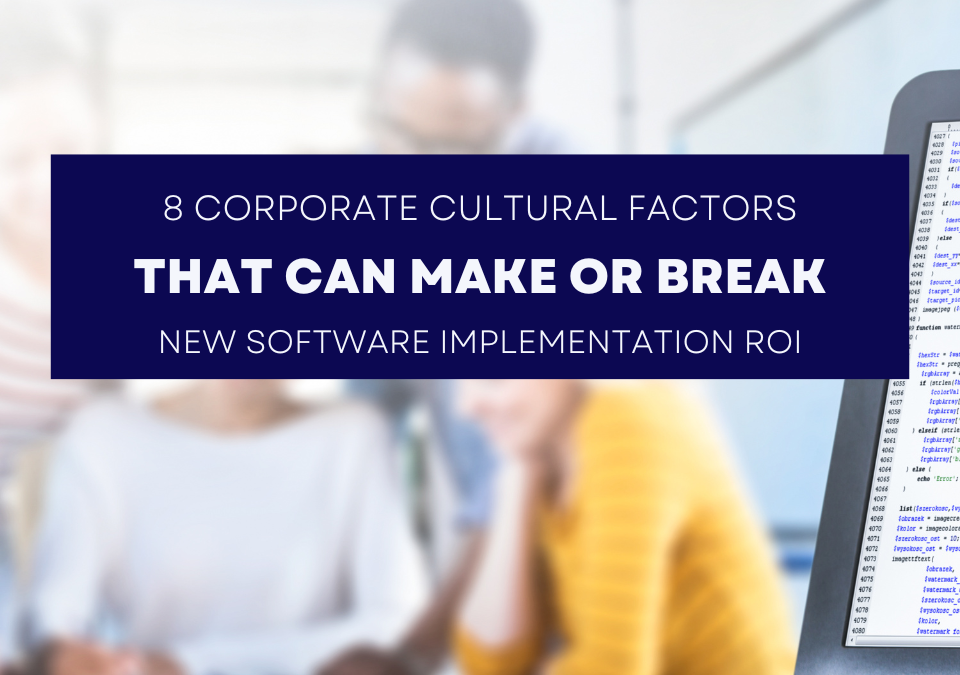
Google Analytics 4 Grower Guide
August 29, 2023
How to Maximize Efficiency with Grower Sales Orders and GrowPoint
September 5, 2023This post is part of our Guest Expert Post Series and is written by Brandi Marek from Ferguson Alliance who answers key questions about company culture and how it impacts the results you get with software.
Why is corporate culture important when dealing with big changes in business, especially one like a new grower operational software system?
- We believe that the 5 key elements to a Culture of Excellence in your organization are:
- Customer Orientation
- Employee Orientation
- Clear Performance Standards
- Strong Process Orientation
- Commitment to Change
- That last one, Commitment to Change, can make initiatives like onboarding a new software system much easier when your organization has already worked and developed their change muscles. The company and the people within it are more comfortable around change. They have a working relationship with it and amongst themselves when it comes to change. They know how to ask questions; they know to expect hiccups and they are more emotionally equipped to deal with them when they arise. They also tend to be more patient with the process and dedicated to getting it right.
- The other very important one to note is Strong Process Orientation. Your software is only as good as the process you put in place. Software is an amazing tool but just like any tool, if you are unaware how to properly use it, chances are you are going to do more damage than good. Your team might not utilize it as they should, or they may not use their brain power as they should. Believing the software will do all the hard work. Your processes need to be solid in physical form for them to make sense and make a difference in the cloud.
“Culture eats new software for a tasty afternoon snack, and then gets indigestion.”
John Beauford
How can an owner assess their culture to see if they are ready for change?
- First and foremost, do a gut check. Think about past change initiatives. How did they go? Be honest with yourself. Remember, you will do yourself no favors by not addressing the issues now.
- Check in on your process orientation as well.
- Ask your team, how they feel about it. What are their hesitations? What do they need in order to make it successful? How can you help them?
- Do a trial run of a small change initiative as a test to see how your team responds and what challenges come up in areas like communication, teamwork, and problem solving. Fixing some of your culture issues with a smaller project can help you big time with a much larger one.
What does an owner or leadership team need to consider in terms of their employee culture before choosing and implementing a new operational software system?
- Meet your team where they are. Telling them to get better with change is not going to in fact make them better with change. Consider that if you have some large cultural issues at play, you will have to have some conversations and give it time for people to see what you can already see.
- Acknowledge that change management is one of the most challenging aspects of leading a team and do some thinking on how your team is the most receptive to change and orient your project for that.
- Again, acknowledge the amount of time it can take. This is not an overnight success story. It takes a good amount of time to orient your team.
- Remember that there will be a regression for all your progression. Your team will go back to where they feel comfortable and will resist. It will be important for you to be patient and to listen and keep them on track.
- Also, remember they could very well have a valid point that you have not considered so make sure you keep both ears open!
What can a grower do to prepare their culture for the change that comes from a new grower software system?
- Certainly think about all of the challenges that may come when it comes to culture but don’t forget to put some focus on the GOOD!
- At the same time you are talking and preparing the team for change, take time to acknowledge the challenges the organization faces and WHY the CHANGE can be GOOD!
- Determine your operating agreements for the project. Make sure your team feels comfortable raising concerns and that they know where to take them when they have them.
- Saying things out loud like:
- We will have open and honest feedback
- We will hear each other
- We will ask questions for clarity
- Just remember, as the leader, it is 1000 times more important that you LIVE THESE AGREEMENTS. The second you are portrayed as not following them is the second they become irrelevant.
- Saying things out loud like:
- Create as much clarity as possible. Often our resistance to change comes from fear of the unknown. Lay out the path as far and clearly as you can to reduce any false assumptions.
- Align expectations. Who is expected to do what, and by when? This goes hand in hand with clarity.
How can a company culture wreck a pending software implementation project?
- If your organization has not dealt much with change or has a technological curve to get around this can be challenging.
- If you have people on your team that can create toxic situations that can be detrimental to your progress.
- If you have had a habit of saying that you were going to do a lot of things or make investments or changes and you have not followed through many times before, it will be challenging to rally your team for another something new.
What aspects of corporate culture will aid the success of a pending software implementation?
- It can’t be stressed enough, COMMUNICATION. It is critical. It really comes down to communication. Aligning expectations, creating clarity, redirecting setbacks; the success of all of these depends solely on your ability to effectively communicate.
- WORK THAT CHANGE MUSCLE! It truly is a muscle that gets more efficient the more you do it. Your team grows more comfortable with it over time and the fear goes down.
- Acknowledging your team and giving feedback on their performance. Reducing as many assumptions as possible, let your team know how they are doing and where they might need to adjust. This keeps the project going and is so POWERFUL!
- Creating measurable goals. How will you know that the software is having positive impacts on the team? This will help the team know how well they are doing and keep them motivated!
How do positive cultural aspects impact the ROI on a software implementation?
- How fast you can get online and start to utilize all of the features and modules can have a GINORMOUS impact on your ROI. How are your physical processes? Having a strong team of effective communicators who trust each other will have the most positive impact on your ROI.
- So many clients of ours have very robust ERP systems and they are only scratching the surface of what they can do because they get stuck in their change resistant rut. Push through that and keep your technological component at the front of your mind. It might take a bigger investment of time in the beginning but you will get it back!
Post implementation what can the leadership do with respect to employees and culture to drive additional ROI from a software implementation?
- Follow-up, follow-up, follow-up! Ask what is working and what is not working.
- What adjustments need to be made?
- Keep those measurable goals going! What do you want to track after you have implemented it?
- Where do you want to go next? Create a phased plan for the software and stay on track.
- After the Spring season do a debrief. What worked really well with the software, where do you think it could do better? What needs to be done to improve it?
Final thoughts?
Remember that just like most other things in business, the people are THE MOST IMPORTANT. They will create and manage the processes that the software will assist with and therefore it is critical for them to be heard, communicated to, and recognized. Culture is PEOPLE. People help create it, people feel it and people affect it. Have the tough conversations, work through the challenges of change and you will be stronger on the other side of it! If you are still struggling, reach out to your dedicated service rep. Our team is here to assist if you have any questions.
Learn More
Ferguson Alliance Family Business Advisors specialize in helping family owned businesses grow, overcome challenges, and create succession and exit plans to maintain the legacy of their business. If you are recognizing issues in your culture and would like help or you just need some advice on where to go next in your business, we invite you to get in touch. Get more information at: www.ferguson-alliance.com.
Learn what to expect from AGS when: onboarding here, training here, customer service here, and engaging with AGS here. If you are a grower looking to improve your operation, contact us so that we can get you up and running with the industry’s leading grower software today!
Author
-

Brandi is a Business Advisor with Ferguson Alliance and a former Nursery Professional for 15 years in her family's business, Magnolia Gardens Nursery.




